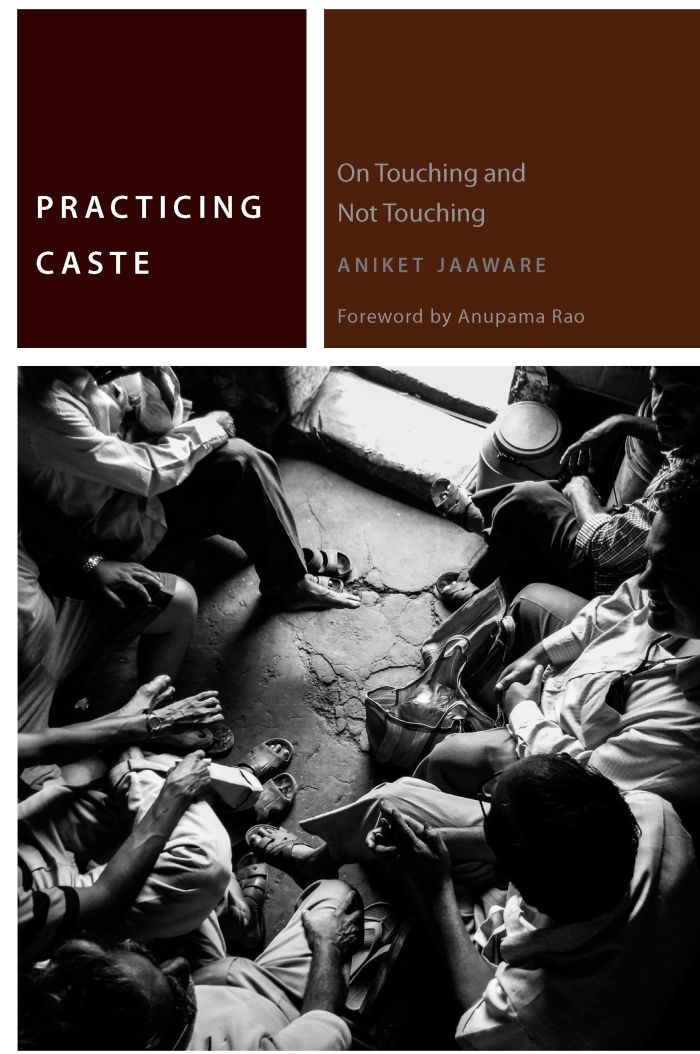Practicing Caste
On Touching and Not Touching

This book can be opened with

“The book is a remarkable exercise in showing what is possible when we attend to caste as if we were confronting it for the first time, bracketing the extensive scholarship about it, and refusing to adopt a ready political stance against caste discrimination and inequality. Practicing Caste asks what new ways of thinking about caste are enabled when we approach ‘caste’ ignorantly, that is, when we forget the weight of its millennial history and turn to caste less as an exception than an occasion to rethink the grounds of sociability. . . . Jaaware is deeply resistant to [the] politics of identity that has resulted from the institution of Dalits as figures of social suffering in the contemporary political public sphere. Instead, his own effort is to read Dalit literature as destitute literature, as writing that stages caste’s persistent and brutal dehumanization as occasion for ethical decision. In posing caste as a problem for ethics, Jaaware returns to that fundamental question of what it means to be-with-others in a startlingly new manner. Aniket Jaaware has written a breathtakingly beautiful book whose form and content mirror the provocation to unlearn what we think we know about caste. We would do well to travel a while with a text that has so much to teach us about being together and apart.”—Anupama Rao, from the Foreword
“This spellbindingly orchestrated book develops its philosophical theory of caste as a practice of touching and not-touching, luminously disclosing caste as a way of regulating, coding, and living an originary and unconditioned touch. It reveals the ethics and politics of touchability as a secret structure of Indic and other modernities. Putting Derrida, Foucault, and Heidegger into conversation with Ambedkar and Phule, Practicing Caste explodes the discussion of caste from its South Asian enclosure. Required reading for anyone interested in a world-spanning comparative account of modernity.”—Ben Conisbee Baer, Princeton University
...Jaaware incisively illuminates a theory of caste as a practice of touching and not touching. In posing caste as a problem for ethics, Jaaware examines the relationship between Untouchables and Touchables to offer new ways of thinking about sociality in and beyond India. The book will be a significant resource for students studying the phenomenology, politics, and sociology of caste-as-practice, comparative accounts of modernity, and ethics.—H-Net Reviews
Aniket Jaaware is Professor of English at Shiv Nadar University. He is the author of Simplifications: An Introduction to Structuralism and Post-structuralim; a volume of short stories, Neon Fish in Dark Water; and several translations into English and Marathi.
Anupama Rao (Foreword By)
Anupama Rao is Associate Professor of History at Barnard College. She is the author of The Caste Question (California, 2009).
Foreword by Anupama Rao vii
Introduction 1
1. Touch and Its Elements and Kinds 11
2. Touch—An A Priori Approach 37
3. Touch in Its Social and Historical Aspects I 61
4. Touch in Its Social and Historical Aspects II 93
5. Touch and Texts: Ancient and Modern 119
6. (Un)touchability of Things and People 148
7. Society, Sociality, Sociability 170
8. Recapitulation with Variations 190
Coda 205
Notes 209
Bibliography 223
Index 233




